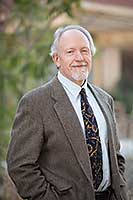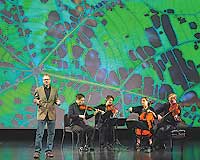SUSTAINABILITY HAPPENINGS January 2018 |
| Award-Winning Crossroads Project: Rising Tide Part of 3rd Annual Winterlude |
Following the success of its 25th anniversary celebratory season, artists will once again flock to idyllic Moab for the Moab Music Festival’s third annual Winterlude. From February 5 - 10, Moab Music Festival presents an event-filled week of educational outreach events and public chamber music concerts for the Grand County community. |
Utah State University Moab’s Program Builder |
At Utah State University-Moab (USU), Steve Hawks is referred to as “the program builder.” He enjoys building new degree programs so much, he recently stepped down from serving as executive director and dean of USU’s Moab campus after nine and a half years to focus on creating more academic programs.  “I get a lot of enjoyment from helping USU-Moab grow into a great resource for locals to better their careers by furthering their education,” said Hawks. “Students need options when it comes to a college degree, especially in rural Utah, and we are working to meet their needs.” Several years ago, Hawks began working with leaders at USU, the faculty and staff at USU Moab, and Moab community leaders to create the Higher Education Action Team (HEAT), with the goal of “turning up the heat” on education in Moab. HEAT met regularly to get input from local businesses, school districts, and city and county officials to find out what degree programs were needed for Moab. It’s thanks to this collaborative effort, Hawks said, that USU-Moab was able to offer such a high number of programs, resulting in a growing campus and the current need for a new campus. However, these programs weren’t solely created at USU-Moab, they were created with the help of USU’s statewide system, with the idea of growing higher education opportunities throughout rural Utah. One request coming from a need in the community was a hospitality and tourism management program. Hawks and other faculty members got to work, and made USU-Moab the first USU campus that offered this program as a minor from the Jon M. Huntsman School of Business. Another major victory was recreation resource management. Originally, this degree was only available at the Logan campus, but it was clear the program was a perfect fit for Moab due to the surrounding landscape and national parks. Now, thanks to the efforts of Hawks and USU to bring this degree to Moab, it has become one of the most popular programs at USU Moab.  More recently, new programs USU Moab and other USU campuses around the state focus on Career & Technical Education (CTE) programs, which offer certifications in business, health, and technology fields, and can also be a starting block to earning a college degree. Hawks has also been instrumental in launching USU’s new master’s degree in public health, which is now available throughout the state from USU. In addition to being a key player in creating this new graduate degree, Hawks now serves as a faculty member in the public health degree program. More recently, new programs USU Moab and other USU campuses around the state focus on Career & Technical Education (CTE) programs, which offer certifications in business, health, and technology fields, and can also be a starting block to earning a college degree. Hawks has also been instrumental in launching USU’s new master’s degree in public health, which is now available throughout the state from USU. In addition to being a key player in creating this new graduate degree, Hawks now serves as a faculty member in the public health degree program.“The amount of work that goes into bringing a new degree to a campus is extensive,” said Hawks. “Without the support and organization of USU’s statewide system, many of the degrees we now offer at USU-Moab would have never been possible.” Numerous resources are required to bring new programs to a campus: new faculty, office space, overhead expenses, infrastructure, technology, and lab space. Additionally, HEAT was created in 2008, during an economic slump. At a time when budgets were being cut, investments were set aside at USU to continue growing programs where they were needed, which resulted in helping improve local economies throughout rural Utah, especially in Moab. Because of the forward-thinking of Hawks and other university and community leaders, USU-Moab has developed into a vital component of the local economy. USU-Moab has grown substantially and resulted in the current development of a new campus. |
